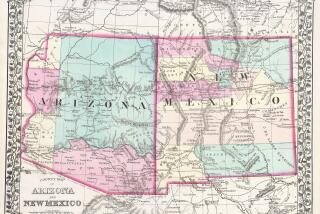Project Counters Exploitation of Elderly : Community service: An Arizona group helps protect older people from financial manipulation, health quackery, even physical abuse.
- Share via
PHOENIX — Suppose you’re an elderly man living alone and using an electric wheelchair. Financial difficulties force you to pawn the chair, but you can’t move without it. What do you do?
Imagine you’re an elderly woman living alone and a salesman knocks on your door, saying that one of your friends referred him. He comes in and describes the product, and you say you’re not interested. But instead of leaving, he stays for hours until you sign a contract and buy the product. Now what?
In Arizona, you can call the Elder Abuse Project. These situations happened, and project staff members or volunteers found remedies.
Of 3.7 million Arizona residents, nearly 468,000 are 65 or older, the Arizona Center on Population Statistics estimates. The center says that total grows by an estimated 250,000 during winters.
About four years ago, Atty. Gen. Bob Corbin and his chief assistants noticed that the number of cases involving financial exploitation of the elderly was growing, says project director Anita O’Riordan.
The project was developed to help attorneys and investigators prosecute such cases and to help the victims. It has evolved into a broader community service.
In the wheelchair case, the man tried to retrieve his chair from the pawnshop but learned it had been sold. Project workers persuaded the pawnshop to locate another electric wheelchair for him.
In the other case, the woman told project representatives that a carpet-cleaning salesman had come to her home and stayed seven hours. During that time, he sold her an expensive “vacuum system” she couldn’t use.
The woman suffered from a heart condition and was so upset by the salesman’s visit that she spent the night in a hospital emergency room.
When she returned home, she was told by the carpet-cleaning company that she was too late to cancel the contract, which included a lien on her home if she failed to make payments on the system.
O’Riordan contacted the company’s headquarters in another state. The company refunded nearly $2,000 to the woman and released her from the contract.
Situations like these happen all the time, and not only to older people, O’Riordan said.
But older people are more likely to become victims because they are more trusting, she said. Many grew up in small towns where everybody knew everybody else and a handshake was enough.
“Even after they’ve been taken . . . they’ll say something like ‘I can’t believe he would do that--he looked so nice,’ ” said Jack Confer of the project staff.
Among other cases:
--Alleged fraudulent sales of fiberglass burial containers totaled about $550,000. A man was charged in April with violating the Arizona Consumer Fraud Act.
--A Phoenix man pleaded guilty in May in connection with fraudulent sales of energy-saving products. Under the plea agreement, he will be liable for restitution to victims. The investigation was triggered by a complaint to the project.
The office also sometimes prosecutes physical abuse cases. Those cases are referred first to either the Department of Health Services or Adult Protective Services, but the agencies may refer a case back to the Elder Abuse Project.
A case that starts with the project usually ends with the project, which can prosecute physical abuse as either a criminal or civil case, Confer said.
The project has three full-time, paid staff members, plus an average of 35 volunteers a year. The $82,000 in salaries and other costs is covered within the attorney general’s budget.
Some people bring their complaints to the project in person. Others use the “Fraudline” phone number. Additionally, volunteers travel to senior centers throughout the state and speak at crime prevention meetings arranged in response to community or group requests.
More to Read
Sign up for Essential California
The most important California stories and recommendations in your inbox every morning.
You may occasionally receive promotional content from the Los Angeles Times.









